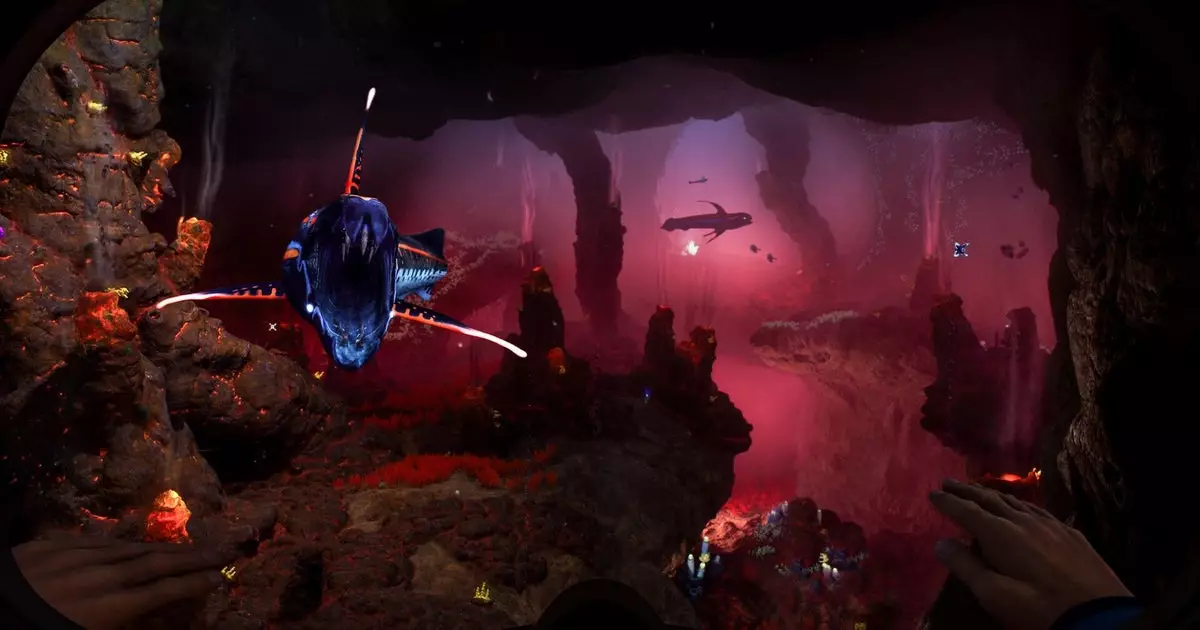The postponement of Subnautica 2, a highly anticipated sequel in the beloved survival game franchise, has sent ripples through the gaming community and industry insiders alike. Originally slated for release before 2026, the game’s delay appears to be driven not by developmental hurdles but by complex corporate maneuvers, revealing the often opaque interplay between publishers and developers. Krafton, the game’s publisher, has opted to push the release date into 2026, citing a need for “additional time” to fine-tune the game — yet beneath this innocuous statement lies a murkier motivation linked to financial incentives and corporate power plays.
This decision is not made in isolation but is intertwined with internal upheaval within Unknown Worlds, the studio behind Subnautica 2. Last week, the company’s leadership underwent a dramatic shakeup, with three senior executives being ousted and replaced by Krafton’s favorite turnaround expert, Steve Papoutsis. The ousting, including that of co-founder Charlie Cleveland, signals more than just a routine change in personnel; it hints at deeper conflicts over the game’s readiness, quality, and the studio’s autonomy. Cleveland’s disappointment, expressed publicly, underscores the brewing tension—a feeling of betrayal that the game, which he considered ready for early access, now faces indefinite delay at the behest of outside interests.
Corporate Interests vs. Creative Confidence
At the heart of this controversy lies a fundamental clash over game development prospects and corporate priorities. Cleveland’s statement, asserting that the game is “ready for early access,” directly conflicts with Krafton’s official stance of waiting for the “right game at the right time.” This disparity suggests internal disagreements over whether the game meets commercial standards or strategic milestones, with Krafton seemingly prioritizing financial and timing considerations over the developers’ sense of readiness.
In a revealing incident, Bloomberg reports that during an all-hands meeting, new CEO Papoutsis explained that the delay wasn’t due to technical issues but appeared to be influenced by other factors—possibly financial. When questioned about the delay’s purpose, Papoutsis responded vaguely about “alignment” but refused to directly acknowledge any link to financial motives. Crucially, he denied any direct intention to influence the previously agreed upon $250 million employee bonus—yet the timing and context cast doubt on this assertion.
This speaks to a broader industry pattern where financial incentives, such as large bonuses, become bargaining chips in corporate decision-making. The delayed launch, potentially saving Krafton from fulfilling hefty bonus obligations, raises ethical concerns about the integrity of game development as a creative endeavor versus a financial instrument. It underscores how high-stakes bonuses and profitability targets can skew priorities, overshadowing quality and player anticipation.
Power Dynamics and Industry Implications
The power struggle at Unknown Worlds reflects a troubling trend in the gaming industry wherein publishers wield disproportionate influence over developers. The ousting of key figures like Cleveland, coupled with the appointment of external executives aligned with the publisher, suggests a shift towards managerial control that can stifle creative independence. Such moves often culminate in delays, compromises on quality, or even canceled projects, all driven by financial or strategic motives.
Krafton’s record-breaking first-quarter profits and massive executive bonuses contrast starkly with the sacrifices endured by the developers. While Krafton reports $608 million in sales and close to $309 million in operating profit, their actions in delaying Subnautica 2 reveal a willingness to leverage financial leverage over creative confidence and community trust. These tactics—using delays as leverage—highlight an industry where profits and control often take precedence over the craft of gaming, stripping developers of their autonomy and fans of transparency.
The community’s response augments industry critique: developers like Cleveland are vocal about their discontent, exposing the often-devastating personal and professional toll such decisions have. This particular case, with a game deeply desired on platforms like Steam, where it already ranks as the second most wishlisted game, accentuates how commercial interests can deprive fans of eagerly awaited experiences.
Future Perspectives and Industry Reflection
The unfolding saga of Subnautica 2 serves as a stark reminder of the fragility of creative independence amid corporate interests. It prompts industry observers to question whether regulatory mechanisms or community activism could curb undue corporate influence. The case illustrates how financial incentives—bonus payments, shareholder pressure, and profit maximization—can trump transparency and quality, ultimately risking consumer trust.
For players and fans, the delay is disappointing but also a wake-up call: the commercial machinery governing game development can override genuine passion and innovation. As the industry continues to evolve, the priority should shift towards fostering a healthier balance between corporate profitability and artistic integrity, ensuring that delays driven by greed do not compromise the creative endeavor or betray loyal audiences who invest not only money but also hope in immersive worlds like Subnautica.
In the end, this controversy encapsulates a broader truth about modern gaming: behind the shimmering veneer of dazzling graphics and exciting announcements lie complex power struggles that shape what we get to experience—and what we don’t.

